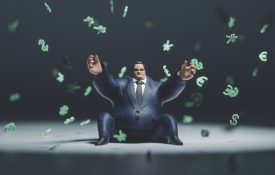-
An Honest Wage: Dollars, Hours and Ethics
In the nation’s capital this month, Mayor Vincent Gray vetoed legislation that would have forced large retailers to pay more than the federal minimum wage, which is $7.25 an hour. Gray was under pressure from Wal-Mart, which threatened not to expand operations in Washington if the so-called “living wage” bill were passed. Passionate debate on the issue has dominated the local news for months. This debate took me back to when I was a young man, working in a thread factory for $1.60 an hour. That was the minimum wage at the time, just raised from $1.40 the year before. I was a student, living on nothing, so I didn’t need a living wage.
-

Cheatin’ Hearts
Free market principles that serve as the cornerstone of many western economies may serve as a sturdy foundation for fraud and deception, a psychological study show.
-
Health Risk
Research has documented that Americans with more money and education have improved health prospects compared to poorer people. Nancy Adler has been a pioneer in investigating how social, psychological, and biological factors associated with socioeconomic status (SES) act together to determine the onset and progression of disease. Adler has investigated why individuals engage in health-damaging behaviors and how their understanding of risk affects their choices. This research has primarily been in reproductive health, examining adolescent decision making regarding contraception, conscious and preconscious motivation for pregnancy, and perceptions of risk of sexually transmitted diseases.
-
Careers and Leadership the Focus of New Psychological Science Blog
Countless professionals spend their workdays facing performance anxiety, low motivation, poor management, and burnout. Others have optimism, enthusiasm, and energy to reach substantial success. Psychological scientists have amassed decades’ worth of research on these traits and behaviors, and on what factors foster an optimal work environment. Now, APS has launched Minds for Business, a blog devoted exclusively to the study of work and leadership. Minds for Business will feature the latest research on leadership and management issues in the modern workplace.
-
The Perils of Being the Decider
Making business judgments, like forecasting the weather, always entails an element of uncertainty. Sound decision-making about when to spend capital – or, analogously, when to prepare for an incoming storm – requires assessing the degree of uncertainty and gauging whether the benefits outweigh the risks. Susan Joslyn, researcher at the University of Washington, studies how we make decisions when outcomes are unclear. In a recent article in Current Directions in Psychological Science, a journal of the Association for Psychological Science, Joslyn and co-author Jared LeClerc examine which factors lead to better (or worse) decision-making in uncertain situations.
-
Sensory Memory Can Improve Decision Making
Conventional wisdom holds that your memory of an experience is strongest right when it’s encoded – after all, if over a century of memory research has taught us anything, it’s that memory traces typically decay over time. But new research published in the September 2013 issue of Psychological Science suggests that a brief delay between seeing a stimulus and having to make a decision about that stimulus can improve the accuracy of our decision making, even if we don’t receive any new information about what the stimulus looked like in the meantime.

